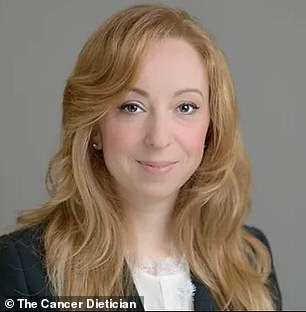I’m a cancer dietitian and these 3 high-fiber breakfasts can help prevent colon cancer – which is killing more young people than ever
The number of cases of bowel cancer is soaring, especially among young people, and the disease will be the leading cause of death among people under 50 by 2030.
Although the overall number of cancer cases has steadily declined in recent decades, doctors are puzzled by the explosion of colorectal cancer cases among younger adults, who are traditionally at low risk for the disease.
And while experts can’t say definitively why the numbers are skyrocketing, lifestyle habits – including diet – are suspected to be a factor.
Now a cancer dietitian has revealed three high fiber breakfasts that could help prevent the disease, explaining that fiber is crucial as it feeds ‘good’ bacteria in the gut that protect the colon.
Fiber is broken down by the body’s gut microbiota – the ecosystem of bacteria, fungi and viruses – through a process called fermentation, which produces beneficial microbes that help protect against colon cancer.
The advice comes after Chadwick Boseman’s widow warned that young people are “much underestimating” the risk of cancer after losing her husband to it.
Fiber is crucial because it feeds the ‘good’ microbes in the gut that protect the intestinal lining
Meredy Birdi, a cancer dietitian based in London, offers her clients specialist advice on nutrition and what to eat after being diagnosed with cancer.
She said Business insider a bowl of oatmeal topped with berries, nuts and mixed seeds is a good option.
Previous research has shown that frequently eating whole grains, such as oats and brown rice, lowers the risk of developing colorectal cancer due to their fiber content, according to cancer prevention organization World Cancer Research Fund International.

Meredy Birdi, a cancer dietitian based in London, offers her clients specialist advice on what to eat and what not to eat after a cancer diagnosis
Nuts and seeds also provide extra fiber, while berries are thought to have cancer-protective properties due to their antioxidants.
Ms. Birdi suggested using 40 grams of oatmeal, 300 ml of preferred milk, a handful of mixed berries, a tablespoon of chopped mixed nuts (such as almonds or walnuts) and a tablespoon of mixed seeds (such as chia seeds, flax seeds or pumpkin seeds).
A pinch of cinnamon can be added for extra flavor.
For a quicker option, the dietitian suggests a simple yogurt and fruit bowl. Greek yogurt is high in protein and contains calcium and probiotics, which help feed the ‘good’ intestinal bacteria and fungi.
As with the oatmeal, extra nuts, seeds and fruit also increase the fiber content.
Birdi suggests three to four tablespoons of Greek yogurt or kefir, topped with four strawberries, half a banana, a tablespoon of mixed seeds and a tablespoon of mixed nuts.

Birdi recommends three to four tablespoons of Greek yogurt or kefir, topped with fruit, mixed seeds, and mixed nuts
Another healthy option is grilled vegetables with halloumi – a type of cheese – eggs and avocado.
She recommends a tablespoon of olive oil, 30 grams of halloumi cheese, one to two eggs, half an avocado and a handful of cherry tomatoes, mushrooms and fresh spinach.
Optionally, one or two slices of whole wheat toast can be added to bulk up the meal and add extra fiber.
Mushrooms are a rich source of dietary fiber, just like spinach and tomatoes.
Statistics show that the number of bowel cancer cases is expected to rise by more than 140 percent among people under the age of 50 by 2030, with approximately 27,000 patients expected to be diagnosed annually.
It is expected that more than 4,000 bowel cancer deaths will also have been recorded by this date, as cancer becomes the biggest killer of this age group.
Almost thirty years ago it was the fourth largest.
Most patients are in their forties, although cases are also more often recorded in people in their thirties.
Dr. Christopher Lieu, a GI medical oncologist at the University of Colorado Cancer Center, shared Fox: ‘This is really becoming the number one cancer-related problem in our younger population.’
Black adults are at greatest risk, with a 20 percent higher risk of cancer than other ethnic groups and a 40 percent higher risk of death.
Colon cancer is especially dangerous because its symptoms are often nonspecific and missed in the early stages. This means that the disease is not diagnosed until it has progressed and spread to other parts of the body, making it more difficult to treat.
The American Cancer Society estimates that more than 150,000 people will be diagnosed with colorectal cancer by 2024.
More than 53,010 people will die from the disease by 2024, the report said.
Symptoms may include blood in the stool, weight loss over a short period of time, pain in the abdomen or changes in bowel habits.
Treatment options vary based on the size, location, and how far the cancer has spread. Common therapies include surgery to remove the tumor(s), chemotherapy, and radiation therapy.
If diagnosed before the disease has spread, the five-year survival rate for colon cancer is 91 percent. But once the disease has spread, the five-year survival rate drops to 72 percent.
